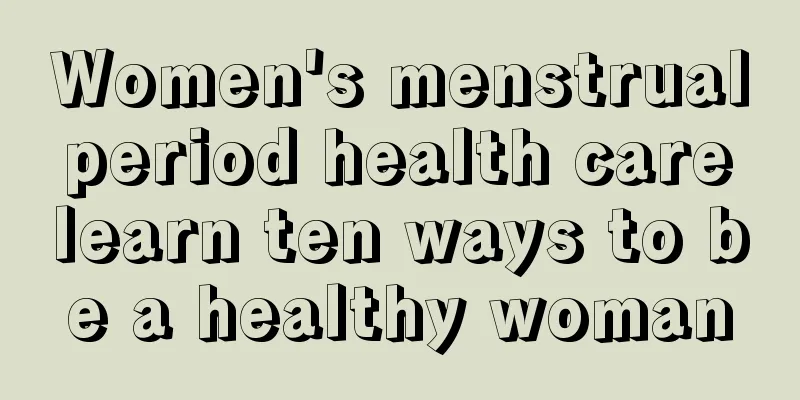Women's menstrual period health care learn ten ways to be a healthy woman

|
During the menstrual period, women are physically weaker and their resistance is reduced, making them more susceptible to gynecological diseases. When a woman is in her menstrual period, she needs to pay attention to all aspects, such as eating a light diet, keeping warm, preventing cold and so on. We recommend that women focus on ten aspects of health care during their menstrual period so that the body can effectively resist damage from external pathogens. 1. Pay attention to hygiene: change sanitary napkins frequently during menstruation, wash the vulva with warm water every day, and it is best to take a shower. When washing with a basin, each person should have one basin, one towel and one soup, and the genitals should be washed separately from the feet. 2. Use menstrual hygiene products correctly: When sanitary napkins cause itching, discomfort or odor to the vulva, stop using it immediately and choose another brand. 3. Change sanitary napkins frequently: During the 2-3 days of menstruation, the amount of menstrual blood is heavy, so you should change sanitary napkins frequently, especially at night, to avoid excessive stimulation of the perineum and infection. When changing sanitary napkins, be sure to insert them from front to back to avoid bringing germs from around the anus into the vagina. 4. Avoid drinking tea: Women who have the habit of drinking tea are prone to premenstrual tension disorder. Therefore, it is not advisable to drink tea during menstruation, especially strong tea, to avoid inducing or aggravating premenstrual tension disorder. 5. Avoid sitting baths: During menstruation, since there are countless small wounds on the endometrium and the cervix is open, it is best not to take sitting baths. 6. Avoid sexual intercourse during menstruation: Sexual intercourse can easily bring bacteria from the vulva and perineum into the vagina, cervix and uterus, allowing the bacteria to grow and multiply in the menstrual blood, causing endometritis, even acute adnexitis and pelvic peritonitis, or triggering endometriosis. 7. Remember your menstrual conditions: such as menstrual cycle, menstrual bleeding time, menstrual blood volume, abdominal pain, irregularity and other discomforts, the time of the last menstrual period, etc. This is very important information for doctors to understand your physical health, diagnose certain gynecological diseases, provide contraception guidance, properly arrange the date of artificial abortion and calculate the expected date of delivery. 8. Keep warm, especially your waist: When the weather is cold, keep your body warm and avoid cold stimulation, such as not sitting in a cold place, not taking cold baths, not eating cold food or drinking cold drinks, etc. Do not take cold baths during menstruation. The female waist is a healthy and sensitive area. If you often wear low-waist pants, your waist will easily get cold, and your lower body will easily get cold, which will directly lead to uterine cold in women. Cold uterus in women can cause symptoms such as cold hands and feet, and dysmenorrhea. 9. Pay attention to maintaining blood circulation in the lower body and keeping the private parts dry and breathable: Lack of exercise in the lower body can lead to pelvic congestion, aggravating dysmenorrhea. It is also not good for the heart and blood vessels, and can cause sagging breasts in women. In addition, the female genitals are moist all year round, and if they can be adequately ventilated, the possibility of gynecological diseases can be reduced. Excessive moisture in the private parts can easily lead to candidal vaginitis and cause dysmenorrhea in women. Try to avoid using non-breathable sanitary pads. 10. Pay attention to your diet: You should be an "omnivore" in terms of diet, eat more than 4 kinds of fruits and vegetables every day, eat fish twice a week, and consume various grains and dairy products for breakfast, and appropriately supplement fiber, folic acid, vitamin C and vitamin E. Avoiding irritating foods such as fishy, cold, spicy, etc. during menstruation can effectively prevent dysmenorrhea. When symptoms of menstrual tension occur, eat a low-salt diet, reduce dairy products and sweets appropriately, increase fiber intake, eat more lean meat, whole wheat, buckwheat, barley and dark green leafy vegetables, etc., which can help relieve mood, eliminate edema and breast pain, and reduce fatigue. Female friends should try their best to take the above protective measures during menstruation, otherwise it would be counterproductive to contract gynecological diseases due to improper care. |
>>: What is the reason for the peculiar smell of female urine? Check the urine in time
Recommend
How to increase female hormones
Although we don’t care much about hormonal change...
What to do if your skin becomes dark yellow after giving birth
There are many female friends whose skin becomes ...
What to do if you have cervical pain during confinement
Most women need to stay in confinement because th...
How to put on makeup well? Just remember these methods
If you are sure to put on makeup, you must first ...
36 weeks pregnant, I found a little blood in my urine
A woman's entire pregnancy period is about fo...
What to eat to treat gynecological diseases
When affected by gynecological diseases, the firs...
What is the effective method for breast enhancement?
Today's society can be said to be an era wher...
How to restore sagging breasts after breastfeeding
After a woman becomes pregnant, her body will gai...
How to use pregnancy test stick after sex
With the development of modern medical technology...
What kind of exercise can girls do to grow taller?
A beautiful lady is a gentleman's dream. Tall...
Can the baby absorb calcium supplemented by breastfeeding mothers?
Diet and nutrition are very important for pregnan...
What to do if you have abdominal pain ten days after giving birth
Now many doctors have found that many women come ...
Is it good to eat green mango during menstruation?
We all know that women's bodies are very frag...
Can cervical congestion heal on its own?
Cervical hematoma is one of the main clinical man...









